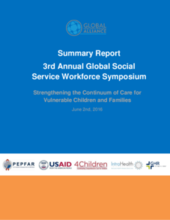Displaying 1671 - 1680 of 2221
Aiming to support the design of effective intervention strategies, this study examines the hypothesized causal effect of foster children's poor school performance on subsequent psychosocial problems, here conceptualized as economic hardship, illicit drug use, and mental health problems, in young adulthood.
Esta investigación se aborda la necesidad de profundizar en la adquisición y consolidación de las competencias profesionales fundamentales para la acción socioeducativa grupal con familias acogedoras.
This paper reports on a research capacity building initiative designed to address the lack of research and evidence on the efficacy of child welfare services in Canada.
The aim of this systematic review was to evaluate the evidence for interventions aimed at improving the quality of contact visits between parents and their children who are in out-of-home care.
This report includes a summary of each of the panel discussions at the symposium, as well as the questions asked, and provides the text of the opening and closing remarks from the event.
This study documents the rates at which children involved with foster care [in the United States] enter the juvenile justice system (crossover or dually involved), and the factors associated with this risk.
This special report from the Ministry of Children and Family Development in British Columbia, Canada presents findings on the number of children in care in the province who were sent to stay in hotels.
This study sought to answer whether children – who have alternative caregiving options - will still express attachment to their maltreating parent.
This study investigated the widely-used but under-researched program for training resource parents (i.e., foster, adoptive, or kinship parents) known as preservice PRIDE (Parent Resources for Information, Development and Education). The sample consisted of 174 participants in Ontario, Canada.
This report provides preliminary estimates of U.S. Adoption and Foster Care Analysis and Reporting System (AFCARS) data for Fiscal Year 2015.



